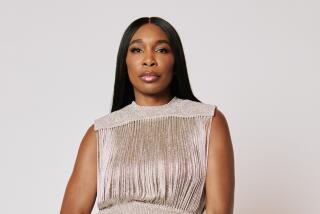A RACE TO JUDGMENT?
- Share via
NEW YORK — How in the world did Venus Williams go from promising young player to lightning rod for racism? How did it happen that what should have been the 17-year-old’s day of triumph--even in defeat--in Sunday’s U.S. Open final, would be more about recrimination than celebration?
Tennis has spent so much time and energy noting how different Williams is from other players that the sport has failed to notice how much she is like nearly every other misguided tennis prodigy:
* Like Andre Agassi, Williams had a parent who stuck a tennis racket in her hand as a toddler and threw tennis balls at her for hours.
* Like Martina Hingis, Williams was taken out of school and taught at home or by tutors on the road.
* Like Mary Pierce, Williams is coached by her father.
* Like a host of players, Williams has spent time in a Florida tennis academy.
* Like Anna Kournikova, Williams turned pro at 14.
* Like Jennifer Capriati, Williams became her family’s sole breadwinner.
Is there a pattern taking shape here? She may seem different but, in reality, very little about Williams is unusual in tennis.
Much has been made of Richard Williams’ “unorthodox” decision to pull his daughter off the junior tennis circuit and out of competitive tennis until she turned pro. In fact, not every professional tennis career was formed in juniors.
Particularly with the women, the system encourages players to jump straight to the pros, bypassing the juniors. Steffi Graf and Arantxa Sanchez Vicario, for instance, turned pro at 13.
Williams has been criticized for her often condescending attitude toward reporters. In this, she’s very much in line with her peers. If Williams at times behaves badly during interviews--such as the time at the French Open when she responded to every question with “yes” or “no” answers--she is no worse than players who rest their chins on the desk and yawn during interviews.
What of the bumping incident with Irina Spirlea? It might have been about race, but more likely it was about the unwritten rules of the sport.
When players leave the court during a changeover, they pass each other at some point, and one must give ground. Often, the lower-ranked player gives the higher-ranked player the right of way.
Sound petty? Maybe, but similar courtesies are observed in every office, schoolyard and professional tennis court. Do players such as Graf or Pete Sampras give way in these situations? Not now. But they did when they started on the tour.
It hardly seems possible that Williams was unaware of what was going on. She was barreling to her chair, apparently with no thought in mind other than sitting down. And if that single-minded, unbroken stride intimidated Spirlea, fine. It’s all part of the game.
Spirlea’s petulant, unprofessional behavior in the incident and her profane remarks after it were clearly unacceptable. She probably will be fined, and should be. But was her conduct racially motivated? Only Spirlea can answer that.
There are no indications, however, that she was acting out of any other emotion than a loser’s frustration and a veteran’s jealousy of a talented younger player.
And that is the core of the problem. The criticism being leveled at Williams is the same in tone and content as has been directed at any number of the other brash young players now on the scene, none of whom is black--or American, for that matter.
Only a few days before the incident, Spirlea had been applauded by her peers for making scathing remarks about the attention paid to Kournikova, apparently solely because the young Russian is pretty. Mirjana Lucic of Croatia is likewise not tolerated because she’s 15 and heavily hyped.
Older players want the younger ones to respect them simply for being older, forgetting how they regarded their elders when they joined the tour.
Tennis does not have the tradition of rookies carrying veterans’ bags, but it agrees with the philosophy. No one is cornered in the locker room and shaved down, or made to cross-dress and sing school songs in a skit, but new players are afforded little leeway and are closely scrutinized.
Players believe that dues must be paid before anyone can proclaim greatness. As Hingis so awkwardly says, they must bring results.
But isn’t that true in any profession?
In Williams’ case, first there was her father’s hyperbolic pronouncements, then her own. And one had yet seen her play tennis. Once she began to play, showing power and raw talent, she continued to boast. Starting the U.S. Open unseeded and ranked 66th is hardly a bragging point.
Now that she has made it to the final and to No. 27 in the world, in the eyes of the players and officials on the tour, Williams can more properly praise herself.
For the tennis tour is, in its way, a workplace. Imagine a profession in which an exceptional young person comes in, but with no resume and no job experience, and demands the boss’ job. Imagine that worker snubbing co-workers. Is this going to be a popular person?
Williams displays so many similarities, but if she is different from her peers, it is in this respect: She seems to be sincere about continuing her education. Many professional tennis players are high school dropouts. Already Williams has distinguished herself as being more articulate than most--when she chooses to be.
What of Williams’ confident remarks about herself and her vocal disregard for other players? It’s not as if tennis players don’t talk smack. No player in men’s or women’s tennis today brags more than Hingis. The difference, of course, is that Hingis has achieved. Williams, until the U.S. Open, had not.
The scene after Sunday’s U.S. Open final was ugly and depressing. An already upset Williams was asked by a reporter in a packed international news conference to comment on her father’s controversial statements. Legitimate question. She chose not to comment. Fair enough.
Then, in an awful escalation, the tone of the news conference turned. She was asked if she had any friends on the tour. She said her sister, Serena. She was asked if people were critical of her confidence because she’s African American. She said people will always pick.
On and on it went until one reporter began shouting that his colleagues were asking racist questions. His exhortation cut off Williams in mid-sentence. The reporter stalked out, the room erupted, and officials abruptly ended the news conference.
The disturbing residue was everywhere, tainting the day and obscuring Williams’ laudable accomplishment.
If Williams has been lucky enough to somehow escape racism in her life, so much the better. If, in the future, however, something awful does happen to her--let’s say it happens on the tennis tour--what will her credibility be if she should raise the issue? Who will listen to Richard Williams and be able to discern between his imagined slights and real incidents?
Racism is too real and too serious a problem to trivialize by invoking its name on self-aggrandizing occasions. Real damage, lasting damage, is done when this happens, for it closes the minds of people to a pervasive evil.
A terrible injustice was done to Venus Williams here. Not by Irina Spirlea. Not by other players on the tour. By Richard Williams, who took his young daughter’s greatest day--her day--and insinuated himself into the center of it, made a mess of it, and left it for her to deal with.
The worst part? It’s not the first time in tennis a parent has betrayed a child in such a manner. Small consolation to Venus Williams to know that she truly belongs to tennis and its modern traditions.
More to Read
Go beyond the scoreboard
Get the latest on L.A.'s teams in the daily Sports Report newsletter.
You may occasionally receive promotional content from the Los Angeles Times.











